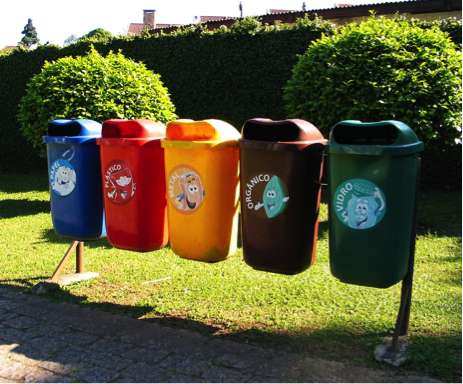Sustainable recycling of municipal solid waste (MSW) is crucial to modern waste management and environmental conservation. Minimizing environmental effects, saving resources, and lessening the impact on landfills entails using a systematic strategy to collect, process, and reuse different materials and resources from household and commercial waste.
Outline of the concepts and components of municipal solid waste
Municipal Solid Waste (MSW), often referred to as “garbage” or “household waste,” is a general term for waste produced by individuals, households, and some commercial or organizations within a specific area such as a city or municipality. An extensive range of items that are dumped on a daily basis are usually included in MSW.
The categories listed below are usually included in MSW, however, this might vary according to the location:
Organic Waste: Biodegradable items such as food scraps, garden debris (such as leaves and grass clippings), and non-recyclable paper goods fall under the category of organic waste. Recycling organic waste helps it to become nutrient-rich soil components.
Paper and Cardboard: MSW frequently includes a variety of paper items, including office paper, periodicals, newspapers, cardboard boxes, and packaging materials.
Plastics: An enormous amount of MSW is made up of plastics, which include things like bottles, containers, bags, packing materials, and different kinds of plastic household products.
Metals: MSW may include both non-ferrous (such as aluminium and copper) and ferrous (such as steel, which includes iron). Cans, appliances, and home objects are common examples.
Electronics: Also known as “E-Waste,” this waste component of MSW is increasing in significance. It consists of outdated or broken electronics such as computers, cell phones, and appliances.
Massive waste: Furniture, beds, and major appliances are examples of items that are too big to fit in regular garbage cans.
Building and Demolition Debris: Although not generally included in municipal solid waste (MSW), certain areas include debris produced by building and demolition operations within the larger MSW category.
It includes abandoned clothes, linens, and other textile goods. Although paints, chemicals, and batteries are examples of minor amounts of domestic hazardous materials also included.
Effective waste management strategies often focus on reducing, reusing, and recycling materials within MSW to minimize the amount sent to landfills or incineration, which helps conserve resources, reduce environmental impact, and promote sustainability.
What are the sustainable recycling methods for municipal solid waste?
Municipal solid waste (MSW) may be recycled sustainably by combining regulations, procedures, and community involvement initiatives. To minimize environmental impact, conserve resources, and reduce the burden on landfills. Here are the key elements of sustainable MSW recycling:
Source Separation: Empowering people and organizations to separate recyclables from non-recyclable garbage at the source, including paper, cardboard, glass, plastic, and metals. Through this Source separations improve the recycling process as well as help in maintaining the quality of recyclables.
Collection Methods: Whether doorstep collection or drop-off locations, effective collection systems are necessary. These methods ought to be created with the least amount of fuel consumption and emissions possible and minimize the garbage collecting sector’s greenhouse gas emissions.
Material Recovery Facilities (MRFs): MRFs play an important part in the process of separating, classifying, and creating ready-for-resale recyclable materials. To increase sorting efficiency, advanced MRFs use automated technology including magnets, screens, and conveyor belts.
Education and Awareness: Public awareness and education programs are crucial in educating locals about the value of recycling, proper recycling techniques, and the advantages recycling has for the environment.
Policies and Regulations: Effective rules and regulations can establish criteria for waste reduction, recycling objectives, and penalties for violation. Legislation is another tool available to policymakers to promote eco-friendly practices and technologies.
Technological Developments: New developments in recycling technology, such as robots, artificial intelligence, and advanced sorting systems, can increase recycling operations’ effectiveness and reduce environmental impact.
Sustainable waste management and the development of a circular economy need the implementation of a comprehensive strategy that incorporates technology, policy, education, and public involvement.
Benefits of sustainable recycling of municipal solid waste
The sustainable recycling of municipal solid waste (MSW) offers a wide range of benefits, which extend to environmental, economic, and social aspects. Here are some of the key advantages:
Environmental Benefits: Recycling helps to preserve precious natural resources by lowering the demand for the extraction of raw materials. compared to producing goods from virgin materials, recycling often uses less energy, resulting in lower energy consumption and greenhouse gas emissions.
Economic Benefits: The recycling sector enhances job opportunities and economic growth by creating jobs in the garbage collection, processing, and recycled product manufacturing industries.
Municipalities manage resources more effectively by lowering the expenses related to garbage disposal.
Social Benefits: Recyclable materials that are sustainable encourage people to get involved in their community, take care of the environment, and feel accountable for managing their garbage. Recycling campaigns can offer a platform for promoting public awareness of environmental concerns and promoting responsible disposal and consumption habits.
Challenges of sustainable recycling of municipal solid waste
The sustainable recycling of municipal solid waste (MSW) is a difficult task that faces a number of challenges. The following are some major obstacles to recycling MSW in a sustainable manner:
Contamination: When recyclables and non-recyclables are combined, contamination happens. Recycled materials become less valuable and marketable when they include contaminants, which lowers their quality. One of the biggest challenges is ensuring correct waste separation and minimizing contamination.
Absence of Recycling Infrastructure: In order to process and sort recyclables effectively, many regions lack the material recovery facilities (MRFs) and recycling centers that are essential.
Costs of Collection and Transportation: It can be expensive to collect and transport recyclables effectively, particularly in rural or dispersed geographic locations.
Global Supply Chain Problems: The flow of recyclable materials may be impacted by disruptions or modifications to global supply networks, such as modifications to trash export/import laws.
The public’s involvement, new regulations, technology advancements, and infrastructure investments for recycling are all necessary to meet these problems. To advance sustainable MSW recycling practices, cooperation between enterprises, communities, and government agencies is essential. In order to achieve sustainability in MSW recycling, it is necessary to ensure economic viability, minimize environmental impact, and divert trash in an efficient manner while also recovering resources.
- About the Author
- Latest Posts
A passionate advocate for all natural and sustainable ideas. With a background in sustainable economics science and a deep love for nature, Sojy has dedicated his career to promoting eco-friendly practices and encouraging others to live a more sustainable lifestyle. He is an avid hiker, gardener, and cook, and loves experimenting with natural ingredients in his recipes and lifestyle routines. Sojy believes that small changes can make a big impact and is constantly seeking out new ways to reduce his carbon footprint and inspire others to do the same




